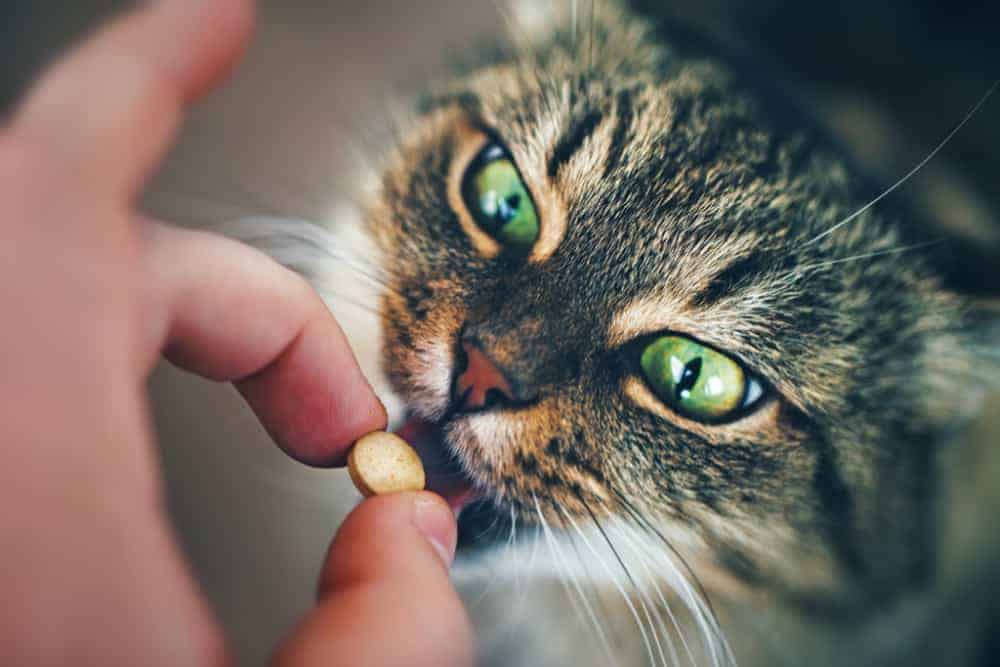5 Best Cat Dewormers in 2024

Choosing the best cat dewormer is a key part of any feline healthcare regimen. Our soft, cuddly, curious, and proud feline friends bring us a lot of joy.
We want to make sure they are taken care of and do anything we can to keep them happy and comfortable. So of course it’s a little distressing to think of our cats being infested with disgusting parasites.
Cat Attitudes is reader-supported. When you buy through links on our site, we may earn an affiliate commission.
The Cornell Feline Health Center says that as many as 45% of cats in some populations are affected by gastrointestinal parasites–worms. Some of the best ways to prevent infection are to keep your pets inside and practice good pet hygiene.
However, the crown jewel in a good defense is a good monthly deworming. But how do you know if your cat has worms? What’s the best worm medicine for cats? Here are our picks for the 5 best cat dewormers, as well as some helpful guides.
5 Best Cat Dewormers (Reviews)
1.) Bayer Tapeworm Dewormer
- For use in cats over 6 weeks of age
- 3-count bottle of tapeworm dewormer for cats
- Easy effective way to remove common tapeworms in cats
- Tablets may be crumbled and mixed with food or taken by mouth
- Tapeworm Dewormer for Cats will remove the common tapeworms, Dipylidium caninum and Taenia taeniaeformis, from cats and...
If you’re treating your cat for fleas, you should be concerned with worms, too. Fleas can carry tapeworms and easily infect your cat if they scratch and eat their fleas.
Bayer’s Tapeworm Dewormer for cats is an easy and effective way to remove your cat’s tapeworms.
It’s convenient and easy to give. You don’t need a prescription, and tapeworms are treated in a single dose. Simply crumble the tablets and mix them with food or treats to help make it a smooth experience for both you and your cat.
Bayer is a trusted pharmaceutical brand, having been making medicines of all shapes and sizes since 1863. While Bayer is known for their human aspirin, they have also developed a praziquantel cat worming tablet. According to Mayo Clinic, praziquantel is used in both cats and humans to kill tapeworms by destroying their muscles.
This Bayer Tapeworm Dewormer is a 3-tablet pack, coming in at roughly $5 a tablet, which seems to be an average price. Since the pack is only 3 tablets, it is also an affordable option if you discover the signature “white rice” shedding that denotes a tapeworm infection.
This worm medicine for cats comes in tablet form. Both product instructions and customer reviews indicate that you can administer the pill directly by mouth, or crush it into your cat’s food.
Customers have generally found the pill easy to administer in either method, though giving pills to cats can be a mixed experience for pet owners. Customers also report signs that cats don’t like the taste, so keep that in mind. If you’re looking for a dewormer for kittens, Bayer recommends use only after 6 weeks of age.
Manufacturers Specs
- Active ingredient: praziquantel
- Delivery: Oral tablet
- Count: 3-pack
What We Like
- Reliable manufacturer
- Easy to buy in small, affordable quantities
- Easy to administer despite pill form
What We Don’t Like
- Be ready to administer a bitter pill to your cat
Summary
This is Amazon’s choice for best cat dewormers for tapeworms and seems pretty straightforward. Three relatively affordable pills that do the job, as long as you’re ready to administer a pill to a cat.
2.)Durvet Liquid Roundworm Dewormer for Cats
No products found.
- Inexpensive control and removal of large roundworms, the most prevalent intestinal parasite to afflict dogs and cats of any age
- Easy to use, may be added directly to pet’s water or food
- Safe for puppies and kittens over 6 weeks of age
- Very palatable
- Age range description: All Stages
While any infection is serious, roundworms in cats differ from tapeworms in that they can cause a host of symptoms and diseases. These include vomiting, diarrhea, anemia, and stomach rupture. So, aggressive treatment is important.
The active ingredient in Durvet’s liquid dewormer for cats is piperazine. It is worth noting that this particular medication paralyzes the worms, allowing them to be expelled. For that reason, you may want to consider cleaning your cat’s litter box even more frequently and thoroughly than usual.
Durvet’s dewormer is recommended at 5mL per pound, so it contains about six doses, assuming an 8 lb. cat. Similar to the Bayer tapeworm dewormer, it can be administered in your cat’s water or food. Notably, this medication is flavored, and customers have reported that it has a much better chance of being successfully administered as a result.
This product also works for dogs, with the same instructions as for cats, so it does double duty if you’re a dog and cat household. One customer noted that this same ingredient (piperazine) is available from farm supply stores for a more affordable price if you don’t need the flavoring.
Manufacturers Specs
- Active ingredient: piperazine
- Delivery: Liquid
- Quantity: 8 oz.
What We Like
- Larger size
- Flavoring seems to mean easier administering
- Works for cats and dogs
What We Don’t Like
- Effective, but doesn’t kill worms, which is kinda gross.
Summary
A simple, straightforward, and effective product that works for both cats and dogs. This was one of our best cat dewormers in terms of a liquid option. Flavoring and an affordable price for a large quantity means you can give your pets the aggressive roundworm treatment they need.
3.) HomeoPet Feline WRM Clear Natural Roundworm Medicine for Cats
- WORM MEDICINE FOR CATS & KITTENS: Our WRM Clear natural pet medicine can help your cat or kitten naturally remove roundworm,...
- SAFE INGREDIENTS: This worm medicine for cats is made from natural ingredients. It is a safe and gentle worm treatment for...
- EASY TO USE: Dose our liquid treatment directly into your cat’s mouth, in water, or at meal/snack time 3 times a day for 14...
- APPROVED FOR YOUR PETS: WRM Clear worm medicine for cats is safe enough to use with adult cats, young cats, kittens, and...
- SIMPLE, SAFE & PURE: Daniel H. Farrington and his veterinarian brother, Thomas Farrington, created HomeoPet to bring...
- Liquid wormer effectively and quickly removes large roundworms in cats and kittens
- Delicious vanilla-flavored liquid is tasty and easy to feed
- Can be administered as-is or added to food
- Formulated for cats and kittens 6 weeks of age or older
- Includes convenient dosing cup as its cap
Excel’s Liquid Dewormer for Cats is broadly similar to Durvet’s offering. They are working with the same active ingredient, piperazine. It is worth noting that Excel’s formulation is a slightly lower dose. Ask your vet if this may be a better option for more sensitive cats.
Like Durvet, Excel’s liquid dewormer is flavored. However, Excel’s offering is about half the size and is marketed as being for cats only. (With a little digging, the dog variety appears to be the same strength piperazine at a higher price. The seller nevertheless states that cat dewormer should only be used on cats and vice versa.)
This product comes in at roughly half the price of Durvet liquid dewormer. (Watch shipping prices, however, to make sure you’re getting the best deal.) Strangely, a line on the Amazon product description advertises Excel as an 8-in-1 product, even though it has one active ingredient that treats one ailment.
Manufacturers Specs
- Active ingredient: piperazine
- Delivery: Liquid
- Quantity: 4 oz.
What We Like
- Different flavoring, size, strength, and price give options
What We Don’t Like
- Strange Amazon listing
Summary
If you had issues with Durvet’s liquid roundworm dewormer, Excel Liquid Roundworm Dewormer for Cats is one of the best cat dewormers we found. A smaller size and lower price make it ideal for having smaller, younger, or less cats to treat.
4.) Pyrantel Pamoate Suspension
- Treat pinworms the easy way with Pyrantel Pamoate Oral Suspension
- This dewormer delivers 50mg/mL of Pyrantel Pamoate to safely and effectively treat pinworms
- Our liquid formula can be taken any time of the day, with or without meals and can be taken alone or with fruit juice or milk
- The vanilla custard flavor tastes great and makes administering to kids quick and easy
- See images for dosage information
Pyrantel pamoate is great for treating hookworms and roundworms in pets. Roundworms and hookworms are typically picked up by your pet when it eats infected soil or feces. Directions & dosage shake well before administering pyrantel is typically given as a single dose to puppies, kittens, and pets with a positive fecal test for roundworms.
It is usually repeated in 2-3 weeks. Ingredients Pyrantel Pamoate Suspension is in a palatable vanilla-flavored vehicle. Each ml contains 50 mg of pyrantel base as pyrantel pamoate.
Here at Cat Attitudes, we pride ourselves on our investigative journalism, or whatever. What we’re trying to say is that we did some digging for you, the reader. If you like Excel’s Liquid Dewormer for Cats, you’re in luck: this product is likely the exact same product but less expensive!
This product is manufactured by Columbia Laboratories out of Lexington, KY. Despite different brand names, both have very similar packaging. More importantly, the concentration of active ingredient piperazine, as well as the dosage instructions, are the same.
Thus, advantages for Excel are going to hold true for Pyrantel Pamoate as well: different concentrations of active ingredients from other products, flavored, etc. Like Durvet and Excel, this product is meant exclusively for roundworms in cats and will expel (not kill) them.
Manufacturers Specs
- Active ingredient: piperazine
- Delivery: Liquid
- Quantity: 4 oz.
What We Like
- Same as Excel means options
What We Don’t Like
- Why sell the same product under two different brands?
Summary
It’s a bit odd that the same roundworm dewormer for cats is being produced under two different brand names by the same manufacturer. However, if one is more readily available than the other, or cheaper at a given time, you can rest knowing they’re the same well-reviewed product.
5.) Drontal Broad Spectrum Cat Wormer
- Broad spectrum dewormer for tapeworms, roundworms and hookworms
- For cats and kittens over 1 month of age and 1.5 pounds
- Give one tablet per 4-8 lbs. body weight
- May be given directly by mouth or in a small amount of food
Like my good friend Tony Stark says, I prefer the weapon you only have to fire once. That’s the way Dad did it, that’s the way America does it, and it’s worked pretty well so far. The previous products we’ve reviewed have been targeted to specific worms.
Drontal Broad Spectrum Cat Wormer is also manufactured by Bayer. This cat worming tablet is a combination of praziquantel and pyrantel. Similar to all the other cat wormers we’ve discussed in this review, praziquantel kills the tapeworms in cats and pyrantel paralyzes pinworms, ringworms, and hookworms so they can be passed in the stool. Thus, what we have here is a one-stop shop for cat deworming.
As far as effectiveness goes, customers swear by this product. It is the medication commonly sold by the pill at the vet, to treat worm issues. People reported either re-treating once or, more often, not at all, and various worm issues were handled.
This particular listing’s 50-count size could be a blessing or curse depending on your particular needs. On one hand, many Amazon customers were working at rescues with a large number of cats. 50 pills doesn’t seem like such a big deal when you have 10-20 cats to work with.
Rescue workers pointed out that the price is much cheaper per pill than you would get from the vet. Likewise, if your cats are outdoor cats and are prone to be infected often, the large size is a great option for you.
However, more than $200 is a steep price if you don’t need these in bulk. You’d be much better off finding a different, more affordable product, or consulting your vet to purchase only a few of these pills.
Like our first review, Drontal is a pill, and a bitter one at that, so you’ll need to be prepared to administer it by force or to mix it with strong, tasty food.
Manufacturers Specs
- Active ingredients: praziquantel and pyrantel
- Delivery: Pill
- Quantity: 50 ct.
What We Like
- Treats multiple types of worms
- Very effective (vet’s choice)
- Great option for cat rescues, multi-cat families, or outdoor cats
What We Don’t Like
- Expensive!
Summary
As the vet’s go-to option for worm treatment, there’s no surprise that this is one of the best cat dewormers out there. If you have the money to spend upfront, and think you’ll eventually go through a 50-count of these pills, they do the job and they do the job thoroughly.
How Do I Know If My Cat Has Worms?
Sure, the idea of worms hanging out in my cat’s belly and my cat’s poop is really gross. But how do I know if my cat has worms? Experts point to the following signs:
1.) Evidence of worms in feces: One of the tell-tale signs of worm infection is the evidence of worms in the feces. Tapeworm segments present as white flecks in the feces, appearing like rice or sesame seeds. Whole roundworms can appear in the feces as well, especially upon successful treatment.
2.) “Scooting” on the floor: A favorite to make fun of in cartoons and comics, this strange phenomenon is your cat’s way of scratching irritation caused by worms. Worms living in and passing through the GI tract and bowels can create irritation in the anus, causing your cat to drag their anus across the carpet to relieve the itching. This will often leave streaks of feces and/or blood on your carpet.
3.) Bloated belly: This can be mistaken for pregnancy, and is a common way that vets check for worm infestation in adopted stray cats. An abnormally bloated belly is a classic sign of worm infestation for both cats and humans.
4.) Diarrhea and vomiting: Particularly with bad infections, the irritation of the GI tract caused by worms can cause irregular and persistent diarrhea and vomiting.
5.) Weight loss: Especially paired with a bloated belly, sustained appetite while losing weight is a good sign that your cat has a worm infection. Worms siphon off nutrients from your cat’s food, so often cats eat the same amount as normal but receive less of the nutrients for themselves. This results in weight loss and a weaker coat.
6.) Decreased energy: As with weight loss, having a portion of their nutrients stolen causes cats to become increasingly lethargic. Cats are prodigious sleepers and loungers, but if you see your cat being uncharacteristically lazy, it could be a sign of a worm infection.
Bloating, scooting, and visual confirmation of worms are three specific ways you can determine if your cat has worms. Diarrhea, vomiting, weight loss, and decreased energy are serious symptoms that can be caused by several different problems, and your cat should be seen by a vet to determine the next steps.
If you suspect that your cat may have worms, your vet can perform physical exams and fecal tests to see if your cat does have worms. Treatment is generally simple, safe, and effective.
Types of Worms in Cats

There are a few different types of worms in cats, but they vary widely in how common they are.
Roundworms are the most common form of worm parasites infecting cats. Between 25% – 75% of cats are affected (a lot of them). Roundworms are generally 3 – 6 inches long, and live in the intestines.
Cats become infected by eating eggs (from feces, ingested during grooming) or rodents infected with larvae. Roundworm infections do not cause serious issues immediately. However, they can cause vomiting, diarrhea, and loss of appetite. Untreated, large infections can cause anemia or stomach rupture, both very serious. Thus, prompt and aggressive treatment is recommended.
Hookworms are smaller than roundworms, only 1/2 inch or less, and attach to the intestine lining of cats. While hookworms are capable of living for a very long time, these infections are less common. Symptoms are similar to roundworm infections, but there is an increased risk of blood loss. Untreated, this can cause serious complications or death.
Tapeworms are significantly different than hookworms or roundworms. Cats are infected with tapeworms when they eat an infected flea or rodent. The tapeworm embeds its head into the GI tract lining and grows a segmented body. When these segments mature, they break off and are passed by the cat. The segments contain more tapeworm eggs. Tapeworms in cats are less harmful than hookworms or roundworms but can create problems if a large infection is allowed to persist.
Other worms include whipworms and different species of stomach worms. These are fairly rare, however.
You’ll sense a common theme. Though worms are gross, they are relatively easy to spot and the best cat dewormers on the market will make quick work of them. They won’t cause severe problems other than some mild discomfort, as long as they are treated quickly and aggressively.
Can You Deworm a Cat at Home?
There are many reasons you might want to deworm a cat at home. You may prefer homeopathic remedies as a supplement or alternative to traditional veterinarian care. Or, you may just want to skip a costly and time-consuming visit. Either way, can you deworm a cat at home?
As far as homeopathic remedies go, the outlook isn’t great. Homeopathic cat dewormers we’ve reviewed are intended to be used in conjunction with traditional dewormers. This of course begs the question, “Why bother?” While remedies claim that they gently prepare the body to expel worms, this is also what traditional medications do. As a general rule, deworming tablets are among the safer medications to give.
On the other hand, can you obtain effective treatments to be used at home without vet interactions? In theory, yes—some of the best cat dewormers out there are available to you online. We’ve reviewed several products that you can purchase to use on your pets by yourself.
Remember, though, that veterinarians are trained professionals who are worth their wages. They are more knowledgeable than the average cat owner and have access to a wider variety of stronger cat dewormers. If your treatment regimen isn’t working, consult your vet for the best next steps.
How to Get Rid of Worms in Cats

Once you’ve figured out that your cat has a worm infection, what next? Here’s our strategy on how to get rid of worms in cats:
1.) Determine what type of worms your cat has. You can make some of these determinations at home, looking for evidence of worms in your cat’s feces and keeping an eye out for symptoms. Particularly, looking for the telltale “rice” of tapeworms, or finding live worms in feces will help make that determination.
The best and most thorough determination, however, will happen at your vet’s office. Your vet is trained to perform physical exams and can send fecal samples out for lab testing that will return specific results based on microscopic testing.
2.) Following your vet’s recommendations, choose the best cat dewormer and treat all the cats in the house. Select the cat worming tablets or liquid of your choice, and go to town! If you are looking for dewormers for kittens, the same cat dewormers work, but in smaller doses. A liquid dewormer is generally recommended.
Pay close attention to the medicine’s instructions and your vet’s recommendations. It is very common for cats to become reinfected with worms. One of the reasons for this is that cats can pass the worms around. Treating all cats (and maybe dogs) in the house will prevent cats from being recontaminated.
3.) Perform multiple treatments. Worms, like fleas, have different gestational cycles. This is the process of mature worms laying eggs, which hatch into larvae and grow into more mature worms. Performing multiple treatments as directed by your medication instructions and your vet, you want to catch every wave of new worms and flush them completely from your cat’s system.
4.) Clean your litter box like a freak. Infected cats shed worm eggs (and sometimes whole worms, depending on the type) in their feces. Common worm medicine for cats actually causes cats to pass live worms in their feces. Thus, detailed and frequent litter box cleaning is a must.
We’ve talked before about daily scooping and frequent cleaning of the litter box. Ideally, you would be removing waste immediately after your cat uses the box and changing litter more regularly. This will keep contamination of the box to a minimum.
5.) Practice prevention. Cats get tapeworms from ingesting fleas and can get other types of worms from hunting rodents or interacting with other infected cats. Look for signs of flea infestation, and begin a flea removal regimen if necessary. If possible, keep your cat indoors and from hunting rodents that contain the worms.
5.) Be patient and persistent. Just because you see more evidence of worms doesn’t mean the treatment isn’t working. Remember, cats passing worms means that the medication is doing its job.
Reinfection is common, especially if you have multiple cats or if they are engaging in the same activities that got them infected in the first place. But, with a little patience and diligence, you can get rid of those disgusting worms.
How Long After Deworming a Cat Are the Worms Gone?

So, you want to know: how long do I have to live with the thought of nasty, wriggly worms in my cat? How long after deworming a cat are the worms gone? Well, remember from the previous guide: you will probably end up treating your cat multiple times to catch the worms at various stages of life and eliminate them all.
For tapeworms in cats, the drug praziquantel begins working within 24 hours, and causes the tapeworms to be digested. So, in theory, within a day or two, all tapeworms in your cat’s system are dead.
Remember, though, that if there are eggs already in your cat’s stool or litter box, or if they ingest another flea carrying eggs, they can be reinfected. Between this and eggs yet to hatch in your cat’s system, a second round is generally recommended 2 weeks after the first round. If you find evidence of worms in the feces 2 weeks after that, consult with your vet.
For roundworms, the timeline is similar. The VCA Hospital network suggests that 2 to 3 treatments, spaced 2-3 weeks apart. Like with tapeworms, this handles worms at various stages of development. That means that you may be dealing with worms for around a month to fully eliminate them.
Final Thoughts
Worms are nasty. There’s no doubt about it. Thankfully, there are some great products out there. We’ve shown you the best cat dewormers to treat worm infections, and your vet will be a valuable resource too. A holistic approach to cat care will help you treat and prevent worms in the first place.
Keep your cat treated for fleas. Keep your cat’s litter box clean. Keep your cat inside and away from rodents as much as possible. Have your cat regularly checked by your vet, and dewormed as recommended. Do these things, and you can move on to thinking about anything other than gross worms.




